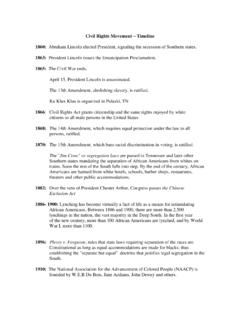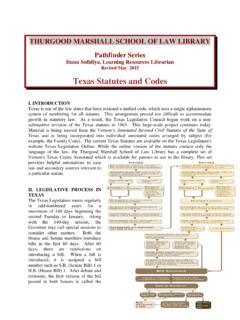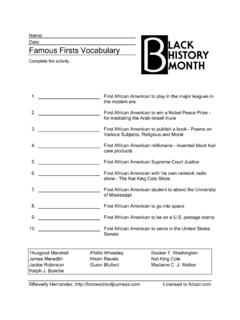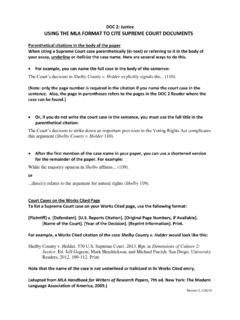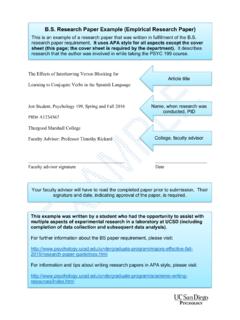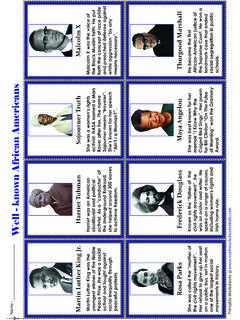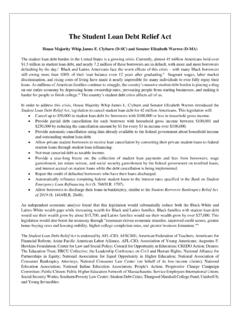Transcription of Civil Rights Movement – Timeline 1860: 1863: 1865 - UMD
1 Civil Rights Movement Timeline 1860: Abraham Lincoln elected President, signaling the secession of Southern states. 1863: President Lincoln issues the Emancipation Proclamation. 1865: The Civil War ends. April 15, President Lincoln is assassinated. The 13th Amendment, abolishing slavery, is ratified. Ku Klux Klan is organized in Pulaski, TN. 1866: Civil Rights Act grants citizenship and the same Rights enjoyed by white citizens to all male persons in the United States 1868: The 14th Amendment, which requires equal protection under the law to all persons, ratified. 1870: The 15th Amendment, which bans racial discrimination in voting, is ratified. The "Jim Crow" or segregation laws are passed in Tennessee and later other Southern states mandating the separation of African Americans from whites on trains. Soon the rest of the South falls into step.
2 By the end of the century, African Americans are banned from white hotels, schools, barber shops, restaurants, theaters and other public accommodations. 1882: Over the veto of President Chester Arthur, Congress passes the Chinese Exclusion Act 1886- 1900: Lynching has become virtually a fact of life as a means for intimidating African Americans. Between 1886 and 1900, there are more than 2,500. lynchings in the nation, the vast majority in the Deep South. In the first year of the new century, more than 100 African Americans are lynched, and by World War I, more than 1100. 1896: Plessy v. Ferguson, rules that state laws requiring separation of the races are Constitutional as long as equal accommodations are made for blacks; thus establishing the "separate but equal" doctrine that justifies legal segregation in the South. 1910: The National Association for the Advancement of Colored People (NAACP) is founded by Du Bois, Jane Addams, John Dewey and others.
3 1920: August 18, 19th Amendment ratified which guarantees all American women the right to vote, after decades of struggle and protest. 1923: Equal Rights Amendment originally written by Alice Paul and introduced in the Congress for the first time, designed to guarantee equal Rights for women. 1924: Indian Citizenship Act granting American citizenship to Native Americans 1925: In its first national demonstration, the Ku Klux Klan marches on Washington, 1942: government places in "relocation camps" some 110,000 Japanese Americans. 1943: Congress repeals Asian Exclusion Acts but establishes quotas 1947: Jackie Robinson becomes first African American to play major league baseball. 1948: President Truman issues an executive order outlawing segregation in the military. Supreme Court, Shelly v. Kramer, declares illegal the government support enforcement of restrictive covenants which exclude minorities from buying homes in white neighborhoods.
4 1954: In Brown v. Board of Education the decision widely regarded as having sparked the modern Civil Rights era, the Supreme Court rules deliberate public school segregation illegal, effectively overturning "separate but equal" doctrine of Plessy v. Ferguson. thurgood marshall heads the NAACP/Legal Defense Fund team winning the ruling. Hernandez v. Texas becomes the first Mexican American discrimination case to reach the Supreme Court. Court rules that persons of a distinct class are protected under the 14th Amendment. 1955: On August 28, 14 year old African-American Emmett Till is beaten and murdered for speaking to a white woman, Mississippi. Hard evidence showed Bryant's husband Roy and his half-brother J. W. Milam kidnapped, brutally tortured and killed Till After a 5-day trial, Bryant and Milam were Months later, they admitted to killing him in a magazine interview but could not be re-tried.
5 Rosa Parks ( Dec 1), African-American Civil Rights activist is jailed for refusing to move to the back of a Montgomery, Alabama, bus. A boycott follows, and the bus segregation ordinance is declared unconstitutional. 1955-56: Montgomery (AL) Bus Boycott ends in victory when a federal ruling, Browder v. Gayle takes effect. US Supreme Court decision declares the Alabama and Montgomery laws requiring segregated buses to be unconstitutional. 1957: Arkansas Gov. Orval Faubus uses the National Guard to block nine black students from attending Little Rock High School. Following a court order, President Eisenhower sends in federal troops to allow the black students to enter the school. 1959: George L. Rockwell founds the American Nazi Party 1960: Four black college students begin sit-ins at the lunch counter of a Greensboro, NC, restaurant where black patrons are not served.
6 The Student Non-Violent Coordinating Committee (SNCC) founded. John F. Kennedy elected president. 1961: Congress of Racial Equality (CORE) organizes Freedom Rides into the South to test new Interstate Commerce Commission regulations and court orders barring segregation in interstate transportation. Riders are beaten by white mob in several places, including Birmingham and Montgomery, Alabama 1962: President Kennedy sends federal troops to the University of Mississippi to end riots so that James Meredith, the school's first black student, can attend. The United Farm Workers Union under the leadership of Cesar Chavez organizes 1963: NAACP field secretary and Civil Rights leader Medgar Evers is assassinated by white supremacist and Klansman from Mississippi, Byron De La Beckwith. August 28 - Over a quarter of a million people participate in the March on Washington.
7 Martin Luther King Jr. delivers his "I Have a Dream" speech. September 15 - The 16th Street Baptist Church, center for Civil Rights meetings, is bombed .Four young African American girls attending Sunday school are killed, 20 others are injured., Birmingham, Alabama November 22 - President Kennedy is assassinated in Dallas, Texas. Vice President Lyndon Johnson becomes president. 1964: Martin Luther King Jr., receives the Nobel Peace Prize. Congress passes the Civil Rights Act of 1964, declaring racial discrimination illegal. The 24th Amendment abolishes the poll tax, which originally had been established in the South after Reconstruction to make it difficult for poor blacks to vote. Freedom Summer, a voter education and registration project, begins. White northern college students volunteer to run practice elections in preparation for the Presidential election of 1964.
8 Two white students, Andrew Goodman and Michael Schwerner, and an African American Civil Rights worker, James Chaney, are murdered, in Mississippi Over the course of the ten-week project: four Civil Rights workers were killed (one in a head-on collision). at least three Mississippi blacks were murdered because of their support for the Civil Rights Movement four people were critically wounded eighty Freedom Summer workers were beaten one-thousand and sixty-two people were arrested (volunteers and locals). thirty-seven churches were bombed or burned thirty Black homes or businesses were bombed or burned 1964-1971: More than 700 race-related Civil disturbance incidents and riots, killing 228. people and injuring 12,741 others, more than 15,000 separate incidents of arson were reported, many black urban neighborhoods were in ruins. The most deadly riots were in Detroit (1967), Los Angeles (1965), and Newark (1967).
9 Measuring severity by also including arrests, injuries, and arson adds Washington (1968) to that list. Particularly following the death of Martin Luther King in April 1968, the riots signaled the end of the carefully orchestrated, non-violent demonstrations of the early Civil Rights Movement . 1965: Jimmie Lee Jackson, an unarmed black man shot by white supremacists, leads to a series of Civil Rights protests in Selma, Ala. 1965: A march from Selma to Montgomery, Alabama, is organized to demand protection for voting Rights . Jimmie Lee Jackson, 26, participating in a march is killed by Alabama state troopers. Malcolm X, Black Muslim leader is assassinated. August 6, A new Voting Rights Act, which made it illegal to force would-be voters to pass literacy tests in order to vote, is signed. 1966: National Organization for Women (NOW) is founded to fight politically for full equality between the sexes.
10 1966: Black Panthers are founded by Huey Newton and Bobby Seale 1967: thurgood marshall becomes the first African American justice of the Supreme Court. Congress enacts the Age Discrimination Act prohibiting employment discrimination against older Americans. June 12, Loving v. Virginia, was a landmark Civil Rights decision of the US. Supreme Court which invalidated laws prohibiting interracial marriage. 1967: Stokely Carmichael, a leader of the Student Nonviolent Coordinating Committee (SNCC), coins the phrase "black power", Washington 1967: Major race riots take place in Newark (July 12 16) and Detroit (July 23 30). 1968: February, Memphis Sanitation Workers Strike April 4, Dr. Martin Luther King Jr. is assassinated in Memphis, Tennessee. The assassination sparks unrest and Civil disorders in 124 cities across the country, including the nation's capital, Washington, President Lyndon B.
